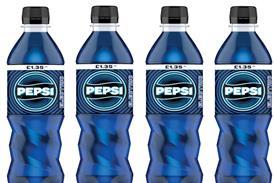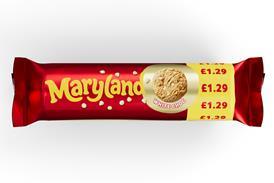A van is a major investment so follow our buying guide to get you on the right road
Buying a new van isn't something to be rushed into. After all, it's a huge financial investment and you need to make sure that you get the right vehicle for the job.
Van or light commercial vehicle websites abound as all the major car companies have sections dedicated to vans. But be prepared to wade through jargon, and a lot of the sites' information is more relevant to tradespeople than retailers.
Often the best route is through personal recommendation, but if that's not possible it's worth trying www.thevanwebsite.co.uk which includes a detailed section on choosing the right van, plus dozens of vans for sale.
Its information is thorough and starts you off by asking whether you actually need a van or whether you can make do with a car.
Once you have decided that a van is definitely the right way to go, the first thing to consider is price. As well as the actual purchase price you need to factor in running costs and possible resale value.
Before you take the plunge, run through the detailed checklist on the website to help you avoid the pitfalls of purchasing.
Do your research - make sure you know what you want before you approach a dealer. Think about the type of van - do you want a micro van, a 4x4, a pick-up or a large van?
Specification - research the options available in your price range and their specifications.
Size - remember that full-size vans are more difficult to manoeuvre.
Fuel economy - most vans have V6 engines, but there are smaller models available with four-cylinder capacity for fuel economy.
Comfort - does the van include an entertainment system or air conditioning?
Safety - some mini vans are among the safest vehicles on the road. However, you should research the crash test rating of any new van you're interested in.
Interior space - how many seats does your van have?
Operating costs - micro vans will offer better fuel economy, but larger vans can often be easier to maintain if repairs are necessary.
In case you were wondering why you need to invest in a van at all, it's worth bearing in mind that your usual car is not built for carrying heavy loads. Lawrie Alford, sector head for automotive and leasing at the Freight Transport Association (FTA), says that retailers may come to regret using the family estate for the cash and carry run, and not only because of the mess that constant loading and unloading makes of the interior trim. "There's a security issue, of course, because everyone can see what's in your vehicle, but you should also be aware that non-commercial vehicles aren't made to carry very heavy loads and you could risk damaging your vehicle or causing an accident," he says.
"Even purpose-built vans have a maximum payload, and it is illegal to carry more than this limit."
There are also tax and insurance implications of using your own car for business purposes.
One advantage of the intense competition among Light Goods Vehicle (LGV) dealers is that they are paying a lot of attention to customers' needs. "The range of options and extras on new vehicles means you can tailor-make a van to your own requirements," says Alford. Extras might include additional security packages and a built-in chiller box.
Commercial vehicle manufacturers have seen impressive growth figures in the past few years. In the year to November, 336,978 new vans were registered, up 3% on the previous year.
Christopher Macgowan, chief executive of motor manufacturers and traders group SMMT, is expecting more of the same in 2008. "Demand for light commercial vehicles in November remained equally strong, with year-on-year growth of 4.5%, supported by robust demand for heavy vans. This sustained growth across all commercial vehicles suggests that 2008 will be a good year for the industry."
When it comes to what's selling well, Duncan Ward, head of commercial vehicle sales at auction company BCA, says the Ford Transit continues to be the big seller in the used marketplace because it comes in a wide variety of lengths, heights and bodies. However, he adds: "The smaller Transit Connect was an instant hit when it launched in 2003 and is now even more affordable as greater numbers have hit the used market."
He believes that small business users looking for something a little different might favour the Vivaro or Traffic due to their practical load capabilities and car-like driving characteristics. He goes on: "Staying with panel vans, the Mercedes Sprinter and Vito are both popular because of their high build quality and reliability with rock solid residuals as an added bonus."
Ward adds that as the only estate car-sized van in the marketplace, the Vauxhall Astravan continues to be popular and provided they are well maintained, both the Citroen Berlingo and Peugeot Partner hold their value well.
BCA holds commercial vehicle auctions at its 16 centres across the country. Prospective buyers can get a sneak preview of what's on offer by logging onto www.commercialauctionview.comAt Renault, the best-selling small van in the UK and across Europe is the Kangoo. At Peugeot, the Partner is the best-selling model, but the 207 is popular too because it's just like driving a car.
Meanwhile, Citroen reckons that for most convenience store owners its best-selling commercial vehicle, the Berlingo, will be best. It is described by the company as "easy to drive, comfortable, competitively priced and economical".
Two payloads are available - 600kg and 800kg - as well as a wide range of rear- and side-load door combinations. It's priced from £9,395+ VAT, and is available with a choice of 75 and 90hp 1.6 HDi diesel engines. There is also a 1.4i petrol-engined version which is available with a dual-fuel (petrol/LPG) conversion and is currently London Congestion Charge-exempt. Berlingos come with three different trim levels.
Once you've chosen the van for you, there's finance to consider. According to www.thevanwebsite.co.uk buyers should sort out their funding before they go out to buy.
The website reckons van leasing is best for those who like the idea of driving a new van every few years and who want lower monthly payments, whereas loans are the best choice for people who want to own their van outright and drivers who travel flexible distances.
But retailers are advised to bear in mind that leasing companies will impose a mileage restriction which they use to work out the depreciated cost of the vehicle - that is, what it will be worth at the end of the leasing term. If you exceed this limit you will be hit with charges.
Specialist insurer Flux Commercial has arranged a deal to allow van owners to transfer their no-claims bonus (NCB) from their car policies. Switching over from a car to a van policy has traditionally meant losing your NCB, but Flux will now accept most conventional NCBs from car drivers towards van policies, second-hand or new, commercial or private.
Volkswagen Commercial Vehicles is offering customers a free DVD which demonstrates the features and benefits of its Caddy, Transporter and Crafter vans. The DVD includes the independent opinions of existing Volkswagen van customers as well as the editors of What Van? and Van Fleet World magazines. Called Let's Go To Work, it can be requested from www.volkswagen-vans.co.uk, or by calling 0800 717131.
do your research so you have some idea of what you want.
Familiarise yourself with pricing - the cost of a van will vary based on wear and tear, the number of miles it has on the clock and its vehicle repair history. You should familiarise yourself with what similar models are selling for. If you are going to visit a dealer or a private owner, why not print off a quote for a van of the same make and model and use that to highlight that you could potentially find a cheaper deal elsewhere.
Inspection - inspect the vehicle thoroughly before you buy. If you don't feel confident performing a check on a used van yourself, then why not take someone along who is? If you're concentrating on driving and getting used to the van, it is a good idea to take along a friend who can listen out for any unusual noises.
Test drive the van - used vans can vary massively depending on how they have been driven in the past.
Mileage - how many miles has the van got on the clock? You should ask to see a full service history and if you feel that the mileage clock has been tampered with, look at the interior of the van to see if it shows more signs of wear and tear than it should.
Brakes - test the brakes thoroughly by performing an emergency stop on a deserted patch of road. If the brakes grind, it usually means that the brake pads or shoes are worn. If the used van skids or swerves, the problem should be investigated.
Engine - examine the oil and anti-freeze levels to see how well the van has been maintained.
Gearbox - do the gears move smoothly? Release the clutch pedal to see if there are any signs of a worn bearing.
Tyres - check that they are at legal levels.
Paperwork - study the used van's paperwork carefully before completing a purchase and look out for anything that seems unusual or out of place. Does the vehicle identification number (VIN) match the vehicle itself and the document? The more paperwork you can find for the van, the better. You should also ask to see its MoT certificates and evidence of its service history. Look for the number of previous owners and, if the van is being sold through a used car dealer, find out when the dealer took delivery of the van. Chances are that if it has been up for sale for a lengthy period of time, the dealer might be interested in a quick sale and therefore accept a lower price.
Source: www.thevanwebsite.co.uk
Glyn Reece,
Penny's, Chester
"I've got a Vauxhall Combo and it's excellent; I haven't had a single problem with it. It's seven years old and I'm the second owner and have had it for nine months. It cost me £3,500 from a dealer and I bought it primarily because of the price and the size. I can fit a standard euro pallet inside or 50 cases.
"I use it to go to the cash and carry three or four times a week. When I had two shops I ran a Transit Luton as well because that was big enough to take an entire cage. However, I worked out that it cost me £100 a month to run and Booker would deliver three Transit loads for just £10, so I got rid of it."
Margaret Attridge,
Crick Post Office & Stores, northamptonshire
"We've got a Ford Connect which we bought new in April. We shopped around and found the best price on the internet - we paid about £11,000. It's on lease purchase for three years.
"I had a look at Renault and Peugeot vans, too, but opted for the Connect because of the space inside. Most of the posties drive them so I had a look at one before deciding.
"We've had no problems with it whatsoever and even find it easier to reverse than our car. We had used a car to go to the cash and carry before but items like drinks were so heavy that we had to go for a van."
Buying a new van isn't something to be rushed into. After all, it's a huge financial investment and you need to make sure that you get the right vehicle for the job.
Van or light commercial vehicle websites abound as all the major car companies have sections dedicated to vans. But be prepared to wade through jargon, and a lot of the sites' information is more relevant to tradespeople than retailers.
Often the best route is through personal recommendation, but if that's not possible it's worth trying www.thevanwebsite.co.uk which includes a detailed section on choosing the right van, plus dozens of vans for sale.
Its information is thorough and starts you off by asking whether you actually need a van or whether you can make do with a car.
Once you have decided that a van is definitely the right way to go, the first thing to consider is price. As well as the actual purchase price you need to factor in running costs and possible resale value.
Before you take the plunge, run through the detailed checklist on the website to help you avoid the pitfalls of purchasing.
Do your research - make sure you know what you want before you approach a dealer. Think about the type of van - do you want a micro van, a 4x4, a pick-up or a large van?
Specification - research the options available in your price range and their specifications.
Size - remember that full-size vans are more difficult to manoeuvre.
Fuel economy - most vans have V6 engines, but there are smaller models available with four-cylinder capacity for fuel economy.
Comfort - does the van include an entertainment system or air conditioning?
Safety - some mini vans are among the safest vehicles on the road. However, you should research the crash test rating of any new van you're interested in.
Interior space - how many seats does your van have?
Operating costs - micro vans will offer better fuel economy, but larger vans can often be easier to maintain if repairs are necessary.
In case you were wondering why you need to invest in a van at all, it's worth bearing in mind that your usual car is not built for carrying heavy loads. Lawrie Alford, sector head for automotive and leasing at the Freight Transport Association (FTA), says that retailers may come to regret using the family estate for the cash and carry run, and not only because of the mess that constant loading and unloading makes of the interior trim. "There's a security issue, of course, because everyone can see what's in your vehicle, but you should also be aware that non-commercial vehicles aren't made to carry very heavy loads and you could risk damaging your vehicle or causing an accident," he says.
"Even purpose-built vans have a maximum payload, and it is illegal to carry more than this limit."
There are also tax and insurance implications of using your own car for business purposes.
One advantage of the intense competition among Light Goods Vehicle (LGV) dealers is that they are paying a lot of attention to customers' needs. "The range of options and extras on new vehicles means you can tailor-make a van to your own requirements," says Alford. Extras might include additional security packages and a built-in chiller box.
Best sellers
Commercial vehicle manufacturers have seen impressive growth figures in the past few years. In the year to November, 336,978 new vans were registered, up 3% on the previous year.
Christopher Macgowan, chief executive of motor manufacturers and traders group SMMT, is expecting more of the same in 2008. "Demand for light commercial vehicles in November remained equally strong, with year-on-year growth of 4.5%, supported by robust demand for heavy vans. This sustained growth across all commercial vehicles suggests that 2008 will be a good year for the industry."
When it comes to what's selling well, Duncan Ward, head of commercial vehicle sales at auction company BCA, says the Ford Transit continues to be the big seller in the used marketplace because it comes in a wide variety of lengths, heights and bodies. However, he adds: "The smaller Transit Connect was an instant hit when it launched in 2003 and is now even more affordable as greater numbers have hit the used market."
He believes that small business users looking for something a little different might favour the Vivaro or Traffic due to their practical load capabilities and car-like driving characteristics. He goes on: "Staying with panel vans, the Mercedes Sprinter and Vito are both popular because of their high build quality and reliability with rock solid residuals as an added bonus."
Ward adds that as the only estate car-sized van in the marketplace, the Vauxhall Astravan continues to be popular and provided they are well maintained, both the Citroen Berlingo and Peugeot Partner hold their value well.
BCA holds commercial vehicle auctions at its 16 centres across the country. Prospective buyers can get a sneak preview of what's on offer by logging onto www.commercialauctionview.comAt Renault, the best-selling small van in the UK and across Europe is the Kangoo. At Peugeot, the Partner is the best-selling model, but the 207 is popular too because it's just like driving a car.
Meanwhile, Citroen reckons that for most convenience store owners its best-selling commercial vehicle, the Berlingo, will be best. It is described by the company as "easy to drive, comfortable, competitively priced and economical".
Two payloads are available - 600kg and 800kg - as well as a wide range of rear- and side-load door combinations. It's priced from £9,395+ VAT, and is available with a choice of 75 and 90hp 1.6 HDi diesel engines. There is also a 1.4i petrol-engined version which is available with a dual-fuel (petrol/LPG) conversion and is currently London Congestion Charge-exempt. Berlingos come with three different trim levels.
Show me the money
Once you've chosen the van for you, there's finance to consider. According to www.thevanwebsite.co.uk buyers should sort out their funding before they go out to buy.
The website reckons van leasing is best for those who like the idea of driving a new van every few years and who want lower monthly payments, whereas loans are the best choice for people who want to own their van outright and drivers who travel flexible distances.
But retailers are advised to bear in mind that leasing companies will impose a mileage restriction which they use to work out the depreciated cost of the vehicle - that is, what it will be worth at the end of the leasing term. If you exceed this limit you will be hit with charges.
On the road
Specialist insurer Flux Commercial has arranged a deal to allow van owners to transfer their no-claims bonus (NCB) from their car policies. Switching over from a car to a van policy has traditionally meant losing your NCB, but Flux will now accept most conventional NCBs from car drivers towards van policies, second-hand or new, commercial or private.
Volkswagen Commercial Vehicles is offering customers a free DVD which demonstrates the features and benefits of its Caddy, Transporter and Crafter vans. The DVD includes the independent opinions of existing Volkswagen van customers as well as the editors of What Van? and Van Fleet World magazines. Called Let's Go To Work, it can be requested from www.volkswagen-vans.co.uk, or by calling 0800 717131.
Buyer's guide tips for buying a used van:
do your research so you have some idea of what you want.
Familiarise yourself with pricing - the cost of a van will vary based on wear and tear, the number of miles it has on the clock and its vehicle repair history. You should familiarise yourself with what similar models are selling for. If you are going to visit a dealer or a private owner, why not print off a quote for a van of the same make and model and use that to highlight that you could potentially find a cheaper deal elsewhere.
Inspection - inspect the vehicle thoroughly before you buy. If you don't feel confident performing a check on a used van yourself, then why not take someone along who is? If you're concentrating on driving and getting used to the van, it is a good idea to take along a friend who can listen out for any unusual noises.
Test drive the van - used vans can vary massively depending on how they have been driven in the past.
Mileage - how many miles has the van got on the clock? You should ask to see a full service history and if you feel that the mileage clock has been tampered with, look at the interior of the van to see if it shows more signs of wear and tear than it should.
Brakes - test the brakes thoroughly by performing an emergency stop on a deserted patch of road. If the brakes grind, it usually means that the brake pads or shoes are worn. If the used van skids or swerves, the problem should be investigated.
Engine - examine the oil and anti-freeze levels to see how well the van has been maintained.
Gearbox - do the gears move smoothly? Release the clutch pedal to see if there are any signs of a worn bearing.
Tyres - check that they are at legal levels.
Paperwork - study the used van's paperwork carefully before completing a purchase and look out for anything that seems unusual or out of place. Does the vehicle identification number (VIN) match the vehicle itself and the document? The more paperwork you can find for the van, the better. You should also ask to see its MoT certificates and evidence of its service history. Look for the number of previous owners and, if the van is being sold through a used car dealer, find out when the dealer took delivery of the van. Chances are that if it has been up for sale for a lengthy period of time, the dealer might be interested in a quick sale and therefore accept a lower price.
Source: www.thevanwebsite.co.uk
class="bold">Retailers' view
Glyn Reece,
Penny's, Chester
"I've got a Vauxhall Combo and it's excellent; I haven't had a single problem with it. It's seven years old and I'm the second owner and have had it for nine months. It cost me £3,500 from a dealer and I bought it primarily because of the price and the size. I can fit a standard euro pallet inside or 50 cases.
"I use it to go to the cash and carry three or four times a week. When I had two shops I ran a Transit Luton as well because that was big enough to take an entire cage. However, I worked out that it cost me £100 a month to run and Booker would deliver three Transit loads for just £10, so I got rid of it."
Margaret Attridge,
Crick Post Office & Stores, northamptonshire
"We've got a Ford Connect which we bought new in April. We shopped around and found the best price on the internet - we paid about £11,000. It's on lease purchase for three years.
"I had a look at Renault and Peugeot vans, too, but opted for the Connect because of the space inside. Most of the posties drive them so I had a look at one before deciding.
"We've had no problems with it whatsoever and even find it easier to reverse than our car. We had used a car to go to the cash and carry before but items like drinks were so heavy that we had to go for a van."


















No comments yet